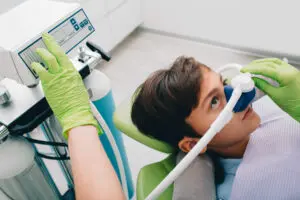05 Dec Orthognathic Surgery: Improving Jaw Alignment and Bite
 When the upper and lower jaws don’t align properly, everyday activities like eating, speaking, and even breathing can become challenging. For patients dealing with significant jaw misalignment, orthognathic surgery, also known as corrective jaw surgery, offers a long-term solution to restore function, balance, and confidence.
This specialized procedure is designed to correct irregularities of the jawbones and reposition them for improved alignment. Unlike orthodontic treatments that focus on straightening teeth, orthognathic surgery addresses the underlying skeletal structure, ensuring that the teeth and jaws work together harmoniously.
Here’s your guide to orthognathic surgery, its benefits, and providers for patients seeking care in Clinton, IA.
When the upper and lower jaws don’t align properly, everyday activities like eating, speaking, and even breathing can become challenging. For patients dealing with significant jaw misalignment, orthognathic surgery, also known as corrective jaw surgery, offers a long-term solution to restore function, balance, and confidence.
This specialized procedure is designed to correct irregularities of the jawbones and reposition them for improved alignment. Unlike orthodontic treatments that focus on straightening teeth, orthognathic surgery addresses the underlying skeletal structure, ensuring that the teeth and jaws work together harmoniously.
Here’s your guide to orthognathic surgery, its benefits, and providers for patients seeking care in Clinton, IA.




 When your smile sustains a serious injury, or issues occurring during the growth and development of your smile, you could have poor balance in your jaw. This could not only impact smile beauty, but leave you vulnerable to oral health complications. Your
When your smile sustains a serious injury, or issues occurring during the growth and development of your smile, you could have poor balance in your jaw. This could not only impact smile beauty, but leave you vulnerable to oral health complications. Your  Our team offers an array of oral surgery procedures to help smiles, from wisdom tooth extraction to dental implant placement. We want to ensure your treatment experience is a positive one, which is why we offer anesthesia. Your
Our team offers an array of oral surgery procedures to help smiles, from wisdom tooth extraction to dental implant placement. We want to ensure your treatment experience is a positive one, which is why we offer anesthesia. Your